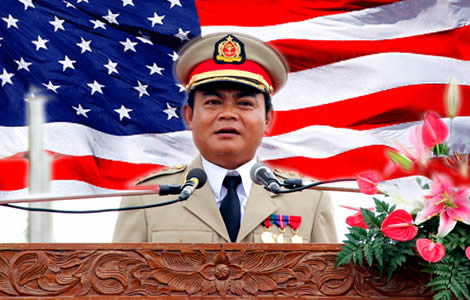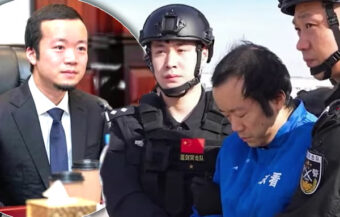Warlord Saw Chit Tu’s grip on Myanmar’s scam capital Myawaddy defies Thai crackdown efforts and fuels U.S. concern ahead of key security talks. Despite sanctions for human trafficking and cybercrime, his empire expands—shielded by legal ambiguity, a raging civil war and regional diplomacy.
The issue of General Saw Chit Tu and his online scam and casino empire in Myanmar’s Myawaddy region is poised to resurface soon. This follows recent sanctions imposed by the United States and an ongoing investigation by US security agencies into the activities of such gangs operating in both Myanmar and Cambodia. Particular attention is focused on China’s role, as Chinese grey capital has been linked to these operations. The renewed scrutiny also raises questions about General Saw Chit Tu’s legal status in Thailand and whether an arrest warrant has been issued. The warlord claims to have struck a deal with Chinese authorities during February’s brief crackdown by Chinese and Thai security forces.

Thailand’s role in Southeast Asia’s online scam crisis faces renewed scrutiny. In February, Prime Minister Paetongtarn Shinawatra acted decisively under pressure from China. She ordered electricity cut to scam compounds along the Thai-Myanmar border.
These compounds had operated freely for years, attracting international criticism. Despite the move’s origins, it won Paetongtarn widespread praise. Indeed, the Thai public viewed it very positively.
At the same time, Chinese officials entered the border area to retrieve their nationals. Some victims had been held captive, but others arrived willingly, lured by employment scams promising work abroad.
Warlord Saw Chit Tu remains untouched as US sanctions and Thai legal ambiguity deepen global concern
The operations in Myawaddy, a key border town, were largely run by warlord General Saw Chit Tu. He controls scam zones, private militias, and checkpoints, creating a state within a state. Intelligence officials say his grip rivals many government-controlled areas.
Thai officials previously claimed they pursued legal action against Chit Tu. At one point, reports said the warlord faced immediate arrest in Thailand.
In February, the Department of Special Investigation (DSI) referred a request for an arrest warrant to the Office of the Attorney-General. However, no warrant was confirmed as issued. Despite this referral, Chit Tu’s legal status in Thailand remains unclear.
Meanwhile, U.S. officials are showing increased interest. There is speculation this issue could feature in upcoming trade talks between Thailand and the United States. The U.S. Treasury sanctioned Chit Tu, his sons, and his militia, the Karen National Army (KNA), on 5 May. The sanctions cited human trafficking, cyber fraud, forced labour, and collusion with Myanmar’s military junta.
The U.S. also labelled the KNA a “significant transnational criminal organization.” This designation enables asset freezes and business restrictions under Executive Order 13581. Yet, Chit Tu remains unchallenged by Thai or Chinese authorities. The February crackdown pressured some criminal syndicates but left his operations largely untouched. Reports suggest a deal was struck: Chit Tu could keep control if he cooperated.
Chit Tu pivots to broker power as Chinese capital and collapsed alliances reshape the scam landscape
Chit Tu later claimed he reached an understanding with Chinese officials. Western analysts believe Thai and Chinese forces coordinated strikes in Karen State in February. This forced Chit Tu to negotiate. By March, he had reinvented himself as a gatekeeper, not just a warlord. He now brokers access to Karen State’s illicit economies.
Local scam networks came under pressure, but Chit Tu’s group endured. In fact, sources say his empire grew stronger.
He anticipated sanctions and safeguarded assets well in advance. Western intelligence agencies believe Chinese capital built much of Chit Tu’s network. Funding reportedly came from She Zhijiang, a Chinese-Cambodian businessman now jailed in Thailand and fighting extradition to China.
She was once a key figure behind the Shwe Kokko project and partnered with Chit Tu. When Chit Tu led a junta-backed Border Guard Force, their alliance was strong. However, in 2024, Chit Tu broke from the junta and launched the KNA.
Some insiders say this split was strategic—a power consolidation move. Despite nominal independence, the KNA continues to cooperate with Myanmar’s military.
Despite sanctions and human rights outcry, scam networks in Karen State expand across global frontiers
The KNA fights against resistance groups like the Karen National Liberation Army (KNLA) and People’s Defence Forces (PDF), both aligned with pro-democracy movements.
The KNA also supports junta campaigns by securing key corridors and providing muscle near Myawaddy. Meanwhile, scam operations persist throughout Chit Tu’s territory. Forced labour camps target foreign victims through crypto fraud, online extortion and romance scams.
Trafficked victims come from as far as Africa, Latin America, and even the United States. According to U.S. officials, Americans lost $3.5 billion to scams linked to this region in 2023. This is up from $2 billion the year before.
The U.S. sanctions are part of a wider crackdown. They follow actions against Cambodian tycoon Ly Yong Phat and scrutiny of Chinese-linked firm Huione Group.
FinCEN alerts highlighted money flows tied to scam centres via global banking and crypto networks. On 1 May, the U.S. named Huione a primary money laundering concern under the Patriot Act. The group allegedly funnelled funds for multiple scam syndicates, including those linked to North Korea.
Despite growing evidence, Thai authorities have yet to pursue robust legal action against Chit Tu or his network.
China denies links to criminal syndicates as its quiet ties to Chit Tu raise credibility questions abroad
It must also be accepted that the warlord is not within the kingdom’s jurisdiction. China’s role remains opaque. Beijing backed Thailand’s February power cut to Myawaddy but allegedly negotiated separate arrangements with figures like Chit Tu behind closed doors.
Chinese officials reportedly used Chit Tu’s militia to rescue their citizens. At the same time, they quietly tolerated his business operations.
Beijing denies supporting criminal syndicates. Yet Chinese investors, infrastructure, and digital platforms are involved, raising questions. She Zhijiang claimed China used him to establish scam zones, then abandoned him.
His lawyers in Bangkok recently alleged that Beijing tacitly supported his ventures until international scrutiny forced a reversal. Meanwhile, Chit Tu’s family holds key roles in his growing empire.
One son commands military operations. The other manages finances. Together, they control real estate, telecoms, and logistics vital to the scam industry. Saw Htoo Eh Moo reportedly runs shell firms connected to telecoms. His brother, Saw Chit Chit, leads combat units aligned with junta operations. Though targeted by U.S. sanctions, Chit Tu’s network appears prepared.
Failure to confront Saw Chit Tu shows limits of local and regional resolve as scam empire consolidates
Sources say he moved assets in advance and remains protected by junta forces and corrupt local allies. Thai intelligence believes he acts as an enforcer and mediator among rival armed groups near Mae Sot.
While hundreds of victims were rescued in February, the leadership behind the scam compounds remains untouched.
U.K. and EU sanctions preceded the U.S. action, yet enforcement remains minimal. More broadly, the saga exposes a deep contradiction in China’s security policy. Publicly, it supported and pushed the February crackdown.
However, it must be conceded that Myanmar is a sovereign country. In February, Chinese security officials entered Myanmar and secured the rescue of their nationals. Mission accomplished.
Ung Ing finally gives the order. Thailand pulls the plug on scam centre electricity in Burma. Cut at 9 am
Chiang Mai professor slams Thai officials for failing to halt electricity sales to Burma’s online scam centres
Arrest of scam centre kingpin and warlord ruler of Myawaddy Colonel Saw Chit Tu demanded by MP
Saw Chit Tu exemplifies a new breed of warlord—digitally savvy, militarised, and protected by regional ambivalence. His survival no longer depends solely on guns but on governments’ unwillingness to act.
In Myanmar’s fractured landscape, he profits by leasing land to fraud groups and offering power and security to scam zones.
Until regional players take concrete steps against figures like Chit Tu, the scam economy will continue to grow. What began as warlord opportunism has evolved into a cyber-enabled criminal enterprise, fortified by silence and complicity.
Join the Thai News forum, follow Thai Examiner on Facebook here
Receive all our stories as they come out on Telegram here
Follow Thai Examiner here
Further reading:
Arrest of scam centre kingpin and warlord ruler of Myawaddy Colonel Saw Chit Tu demanded by MP
Visa waiver scheme questioned with another China Crisis for foreign tourism driven by security fears
Tourism cryptocurrency sandbox payment plan is bound to face stiff opposition from the central bank
Thaksin calls for crypto-based bonds. Notes success and beauty of Isan women who marry foreigners
Future Bank of Thailand Chairman Pick warns that the Thai economy faces ‘disaster’ without rate cuts


















